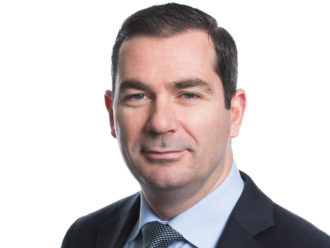You joined London CIV during a pandemic. How have those 18 months been?
A big step forward for us came in June when we started going back to the office in dribs and drabs. We have since moved to a hybrid working arrangement. But the real turning point was in September when we held a conference with our partner funds.
It was the first time many of us met all our clients face-to-face. We managed that period of working from home reasonably well and were surprised by how productive we were. During that time, we launched six funds, four of which were private markets.
We also made progress on our Paris-aligned ESG implementation. Sustainable investment is a critical part of our funds. ESG cuts through everything we do. We have three specialists who work closely with our investment team to build ESG into our strategies.
The key element here is our net-zero target for 2040, which is ambitious. Some clients say it’s too ambitious, while some think it’s not ambitious enough, but it works for us as a group. Over the past three months, we have seen a 2% shift to Paris-aligned products by our clients.
A billion pounds in a quarter is quite an achievement. In terms of pooling, the critical turning point came in September when many of us first met our clients. Pooling happened gradually during lockdown, but it has accelerated since we were able to meet our clients in the flesh and talk through their strategies.
You are no stranger to local government pension schemes having joined from LGPS Central. But how does the size of London CIV affect your approach to pooling?
It is challenging having 32 clients compared to the nine we had at LGPS Central. We have double the number of partner funds than the next largest pool. The ability of the investment team to meet every client is limited, so we attach great importance to our London CIV client team.
It is not just about communicating with 32 organisations. We have 32 clients, 32 shareholders, 32 pensions officers, 32 advisers and 32 consultants. So, in essence, we have to deal with a lot of stakeholders.
There are many ways to do this. In lockdown, we had a monthly business update meeting and regular meetings with the investors in each fund. We keep in touch once the funds are launched, grouping likeminded clients [seed investment groups] together. That is critical to developing things from our perspective.
In the early days of pooling London CIV was under pressure to speak with one voice, which must have been challenging. How are you circumventing that problem?
Like everyone, we embrace the diversity of our clients. Yes, it is a challenge, but whatever their political differences or ambitions, the key for finding common ground is bringing ESG into the funds we manage for our clients.
It is, therefore, critical to have our own London CIV net-zero target though we must remember that each of our underlying clients sets their own target. They invest in what aligns with their own strategic asset allocation, and we set up funds which have an ESG, Paris alignment or net-zero direction of travel for them. That is a key pooling cry.
It is about moving away from the old days when people looked at risk and return to now looking to net-zero targets and liquidity requirements along with risk and return. Again, it is about making sure everyone embraces their diversity rather than going off and investing in separate funds, which is counter to what pooling is about. That has been working well and so we have been moving in the right direction.
Could you give some examples?
We are doing some work on property fund launches. We already have the London Fund [with LPP Investments] and the Inflation Plus Fund that are investing in property and holding workshops with clients who want to set up new property funds. It is a win-win for clients to invest in existing funds because it means more pooling and better value for money.
So, we get them into groups of those wanting to invest in residential property, for example, and then set that up as the seed investment group. It is about making sure they are like-minded investors. Funnily enough, they do not always go along political grounds. Actually, politics should wash through, we are after a common ground and investing for the long term.
So, you have pooled around half of your member funds’ assets?
It is a bit higher now. In the latest quarter we increased that by 2.9%. So, in terms of progress on pooling, we have gone to 58% from 55%, which is a big achievement. We have launched new funds, but there have also been win-wins of people taking money which has not been pooled yet into existing products. That has been important. Overall, our clients have close to £50bn in assets.
What is your approach to outsourcing investment strategies?
This is where we differ from other pools. We don’t do in-house management; everything is externally managed. We select managers to fulfil our fund requirements, but we are the AIFM [Alternative Investment Fund Manager]. Essentially, we oversee the manager or managers, so we are not completely outsourced. London CIV also has multi-manager funds.
We design a product and then monitor and manage those investments. But we do not currently manage the money directly. What we are beginning to do more and more is select several managers to run a single mandate while we sit as the overarching manager, doing the risk analysis and selecting the managers.
What happens if a client wants to invest in a specific strategy which is not in your fund range?
Our clients have been moving to private markets, so we have launched five funds: Inflation Plus, Private Debt; Infrastructure; the London Fund, which is a social impact fund investing in infrastructure and property; and our flagship Renewable Infrastructure Fund. The joy of what we are doing here is that it fits in with increasing concerns about inflation. The infrastructure, renewables and property funds we are looking to launch will help our clients manage their inflation exposed pension benefits.
Is that why you have expanded into these sectors?
Partly yes to get that inflation protection. If inflation is running at 5.5%, a scheme needs to make an investment return of 5.5% or their ability to meet their pensions benefits will recede. So, we need to make sure we keep up the pace. Our clients are aware of that, and they also know that the core assets of equities and bonds may not help in paying long-term pensions.
My view is that equities will probably do a fairly good job of matching inflation over time. Bonds, sadly, will not. Many of our clients would question whether I am right about equities, but they all agree that bonds are a bad place to be and, therefore, they are looking for inflation protection elsewhere. Ergo, they invest in property, infrastructure and private markets where they believe they can get inflation-like returns.
Our London CIV Inflation Plus Fund typically invests in long-lease property. That is one of our fastest growing funds. Our Renewable Infrastructure Fund initially had £400m of demand but within six months grew to £680m with more clients coming in the future. It is growing faster than expected. That fund hits on a lot of the things people want, such as meeting net-zero targets and beating inflation.
Why will equities continue to rise?
Inflation has been matched by equities in the long run. My view is that when inflation moves from zero to 4% it is a great time to own equities. History has shown that when it goes above 4% it becomes “a little bit dodgy”. In the end, even in the periods when inflation goes above 4%, equities may not match inflation, but I am pretty sure they will outperform bonds.
The other thing with equities right now is that I would be wary that they could beat inflation, but they will have a good crack at it. Equities, certainly in emerging markets, offer yields which almost match inflation. A 3% yield does not quite meet inflation, but it’s a good start.
The key driver for equities is earnings, which over time tend to go up. But again, a little bit of inflation is not a bad thing. If we are facing a lot of inflation, we need to question our allocation a bit more and maybe we need to look at other asset classes.
You have not mentioned the elephant in the room, which is monetary tightening. Could it hit equities?
Historically yes, but we need to remember that the way central banks behave has changed dramatically over the past 20 years. Because of the introduction of quantitative easing, the effect of interest rate moves will probably be less impactful
today. We saw that when they came down, it did not have much impact, so it will be interesting to see what will happen when rates go up. I am wary of the assumption that if inflation goes up, we will raise interest rates and then inflation will come down again. I am not sure it works that way. In my experience, they leapfrog each other.
Rather than having a wage price spiral into a price interest rate spiral, raising rates could encourage increased prices. So, quite frankly, if we are not going through a bad debt cycle, the biggest beneficiary will be the finance sector, which will benefit from rising interest rates. Higher interest rates are good news for some parts of the market.
So, we might see a change in the type of equities that do well, perhaps income and value rather than growth stocks?
Absolutely. The starkest change we might see could be a reversal between growth and value. Value has underperformed for 10 years, and we are seeing quite a severe reversal of late. Obviously, when you get 10 years of success in growth assets, a lot of clients will be overweight growth. That is one of the challenges going forward. We need to think about if we want greater factor diversity in our portfolios.
You don’t want to make that call too early?
Yes, as the value/income funds we had in the past have long been closed. So, if a client decided they want to invest in value, we do not have a product immediately available. This is something we will look to establish with our clients. But for this to happen, we need to be certain that what happened in the past six months is a confirmation of a longer-term trend. It will take some time for our investors to recognise that, but we may be getting to that stage.
So, you may be looking at asset managers offering value funds?
We need to have client demand before we launch a fund. We have to make sure that if they decide to invest in value, that we have a fund doing that. That could be a challenge. Typically, what will happen is that they will make up their mind and suddenly ask: “Right, where’s our product?” And we reply: “This may take some time to set up.” We need to work together to anticipate what we might need in the future.
Does London CIV set a minimum threshold for investor commitments?
Not as such, but there is an unwritten rule that if there is just a single client, that’s not pooling. We like to see at least two or three clients for a fund and, to get the economies of scale, £250m to £300m is our minimum. Yet there are some asset classes where you are not going to raise £300m immediately. We need to have the confidence that funds will see increasing client investments in the future as it is costly to set up and close funds over time.
That sounds a bit like selling groceries. Whenever you buy a product no one wants it, but when you don’t have it, everyone asks for it.
“Yes, it’s a bit like demanding strawberries at Christmas. It takes them at least six months to grow and you cannot expect them in the middle of winter. But we try to be pre-emptive and anticipate future demand. We have done this, for example, in private markets where we set up a renewables fund two years ago. A value fund is one of the things we may be looking into.
What is your outlook for the global economy?
As we come out of Covid, the outlook is reasonably good. There will be fits and starts but we are gradually moving in the right direction. Clearly, the challenge is what happens to inflation and interest rates.
My view is that we are going to have to deal with elevated inflation for at least 12 months. The movement in interest rates is largely expected, but the key risk is what happens to bonds. Everyone is going to be chasing after inflation protection. My worry is that it will take us a year to invest in it, by which time we will not want it anymore.
At the same time, as a defined benefit scheme, we will always have to offer returns of inflation-plus 2% because wages are rise. To come back to a point I made earlier, while we have 32 clients, they all have the same pension plan and benefit requirements. In the long run, that should be good for pooling. If you are a local government worker in Hackney or Greenwich, you have the same return requirement. So, our client funds should be aligned because they have to meet the same challenge to meet benefit promises.”





Comments